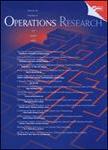-
作者:Hathaway, Brett A.; Kagan, Evgeny; Dada, Maqbool
作者单位:Johns Hopkins University
摘要:In many service encounters, frontline workers ( often referred to as gatekeepers) have the discretion to attempt to resolve a customer request or to transfer the customer to an expert service provider. Motivated by an incentive redesign at a call center of a midsize U.S.-based bank, we formulate and solve an analytical model of the gate-keeper's transfer response to different incentive schemes and congestion levels. We then test several model predictions experimentally. Our experiments show th...
-
作者:Li, Wenhao; Sun, Zhankun; Hong, L. Jeff
作者单位:City University of Hong Kong; Fudan University
摘要:Upon arrival at emergency departments (EDs), patients are classified into different triage levels indicating their urgency. Using data from a large hospital in Canada, we find that, within the same triage level, the average waiting time (time from triage to initial assessment by a physician) of patients who are discharged is shorter than that of patients who are admitted for middle- and low-acuity patients, suggesting that the order in which patients are served deviates from first-come, first-...
-
作者:Bachmat, Eitan; Erland, Sveinung; Jaehn, Florian; Neumann, Simone
作者单位:Ben-Gurion University of the Negev; Simons Foundation; Western Norway University of Applied Sciences; Helmut Schmidt University
摘要:Managerial optimization challenges in service industries often entail the need to ensure customer satisfaction. For example, in airplane boarding, the boarding time should be minimized, but to ensure customer satisfaction, the process must not be too stressful for passengers. However, many authors assume that total boarding time minimization and customer satisfaction are complementary goals, even though there is little empirical knowledge on the topic. We challenge this assumption and contend ...
-
作者:Yoo, Onesun Steve; Zhan, Dongyuan
作者单位:University of London; University College London
摘要:A critical issue in operating massive open online courses (MOOCs) is the scalability of providing feedback. Because it is not feasible for instructors to grade a large number of students' assignments, MOOCs use peer grading systems. This study investigates the efficacy of that practice when student graders are rational economic agents. We characterize grading as a process of (a) acquiring information to assess an assignment's quality and (b) reporting a score. This process entails a tradeoff b...

